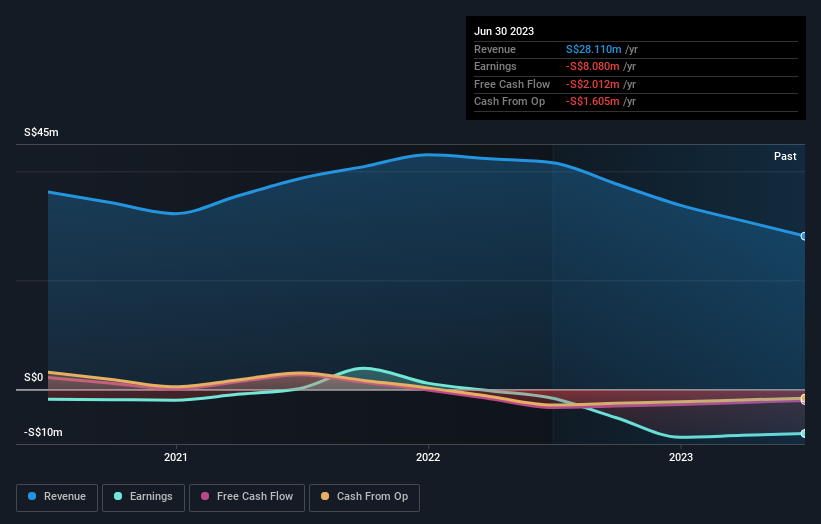Loss-making Meta Health (Catalist:5DX) sheds a further S$543k, taking total shareholder losses to 67% over 1 year
Investing in stocks comes with the risk that the share price will fall. Unfortunately, shareholders of Meta Health Limited (Catalist:5DX) have suffered share price declines over the last year. The share price has slid 78% in that time. We note that it has not been easy for shareholders over three years, either; the share price is down 71% in that time. Shareholders have had an even rougher run lately, with the share price down 57% in the last 90 days.
After losing 14% this past week, it's worth investigating the company's fundamentals to see what we can infer from past performance.
See our latest analysis for Meta Health
Meta Health wasn't profitable in the last twelve months, it is unlikely we'll see a strong correlation between its share price and its earnings per share (EPS). Arguably revenue is our next best option. Generally speaking, companies without profits are expected to grow revenue every year, and at a good clip. Some companies are willing to postpone profitability to grow revenue faster, but in that case one does expect good top-line growth.
Meta Health's revenue didn't grow at all in the last year. In fact, it fell 32%. That looks pretty grim, at a glance. The market obviously agrees, since the share price tanked 78%. Holders should not lose the lesson: loss making companies should grow revenue. Of course, extreme share price falls can be an opportunity for those who are willing to really dig deeper to understand a high risk company like this.
The company's revenue and earnings (over time) are depicted in the image below (click to see the exact numbers).
This free interactive report on Meta Health's balance sheet strength is a great place to start, if you want to investigate the stock further.
What About The Total Shareholder Return (TSR)?
We've already covered Meta Health's share price action, but we should also mention its total shareholder return (TSR). The TSR is a return calculation that accounts for the value of cash dividends (assuming that any dividend received was reinvested) and the calculated value of any discounted capital raisings and spin-offs. Meta Health's TSR of was a loss of 67% for the 1 year. That wasn't as bad as its share price return, because it has paid dividends.
A Different Perspective
Meta Health shareholders are down 67% for the year, but the market itself is up 7.4%. However, keep in mind that even the best stocks will sometimes underperform the market over a twelve month period. Unfortunately, last year's performance may indicate unresolved challenges, given that it was worse than the annualised loss of 11% over the last half decade. Generally speaking long term share price weakness can be a bad sign, though contrarian investors might want to research the stock in hope of a turnaround. While it is well worth considering the different impacts that market conditions can have on the share price, there are other factors that are even more important. Even so, be aware that Meta Health is showing 4 warning signs in our investment analysis , you should know about...
But note: Meta Health may not be the best stock to buy. So take a peek at this free list of interesting companies with past earnings growth (and further growth forecast).
Please note, the market returns quoted in this article reflect the market weighted average returns of stocks that currently trade on Singaporean exchanges.
Have feedback on this article? Concerned about the content? Get in touch with us directly. Alternatively, email editorial-team (at) simplywallst.com.
This article by Simply Wall St is general in nature. We provide commentary based on historical data and analyst forecasts only using an unbiased methodology and our articles are not intended to be financial advice. It does not constitute a recommendation to buy or sell any stock, and does not take account of your objectives, or your financial situation. We aim to bring you long-term focused analysis driven by fundamental data. Note that our analysis may not factor in the latest price-sensitive company announcements or qualitative material. Simply Wall St has no position in any stocks mentioned.

